‘Jeju Is Now No Longer Lonely’
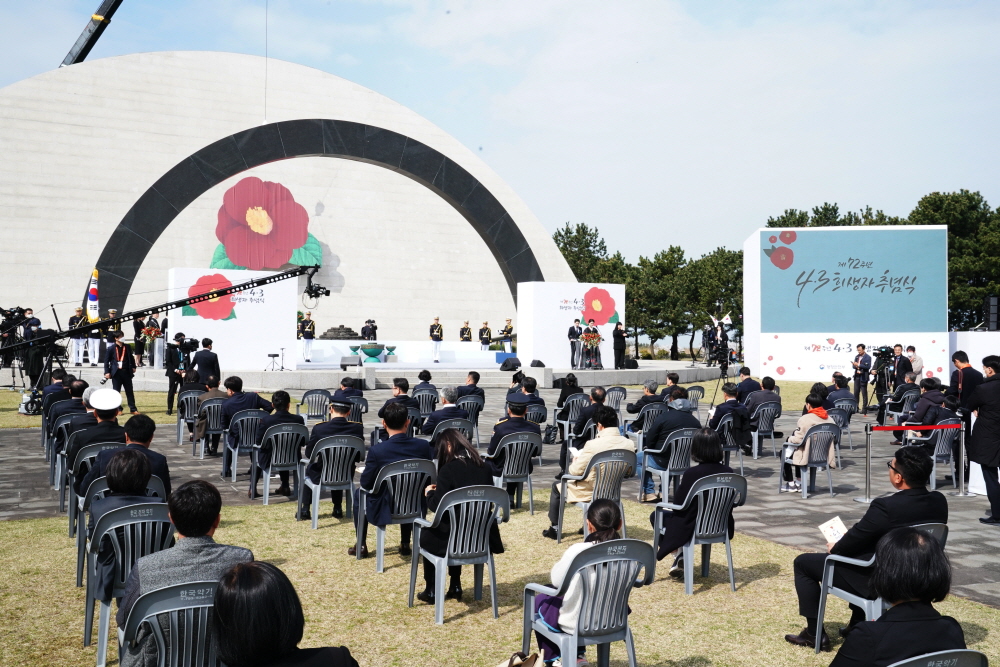 [Field] 72nd Anniversary Memorial Ceremony in Honor of Jeju 4·3 Victims:
[Field] 72nd Anniversary Memorial Ceremony in Honor of Jeju 4·3 Victims:
President Moon Jae-in Calls for Revision of Jeju 4·3 Special Act during Second In-Office Visit
[Full Story] Despite grappling with the COVID-19 pandemic, South Korea paid tribute to the souls of the Jeju 4·3 victims on April 3 during a memorial ceremony held in their honor at the Jeju 4·3 Peace Park. The event was simplified from previous years in compliance with the state-announced social distancing guidelines due to the coronavirus. However, the presence of President Moon Jae-in and the first lady at the ceremony brought warm consolation to the victims’ bereaved families and disseminated nationwide the values of reconciliation and mutual benefit reflected in Jeju 4·3.
▲ Simplified memorial ceremony, with president’s second visit during term
At 7:30 a.m., the mood in the Jeju 4·3 Peace Park was different from that of previous memorial ceremonies. Unlike past events, the Memorial Tablets Enshrinement Room, the Tombstone Park for the Missing and the Headstone Monument Engraved with Names of the Deceased were not crowded with people. Still, some families came early in the morning, hoping to hold ancestral rituals when no or few people were around in line with the COVID-19 guidelines. The visitors, without exception wearing cloth face coverings and cotton gloves, offered alcoholic beverages as tribute and performed ritual bows in front of the memorial tables, the grave markers, or the plaques listing the names of their loved ones who died during Jeju 4·3.
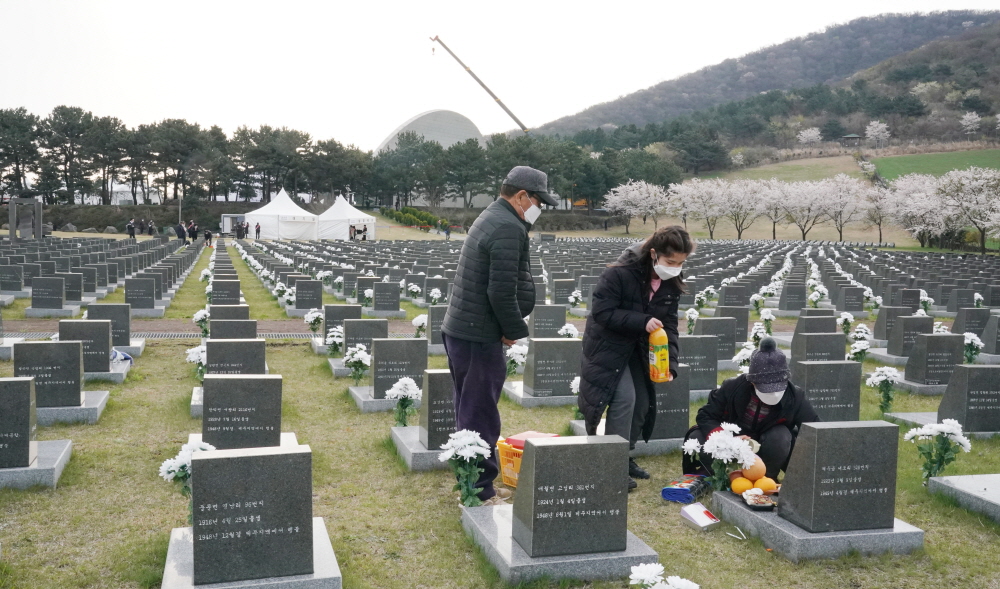
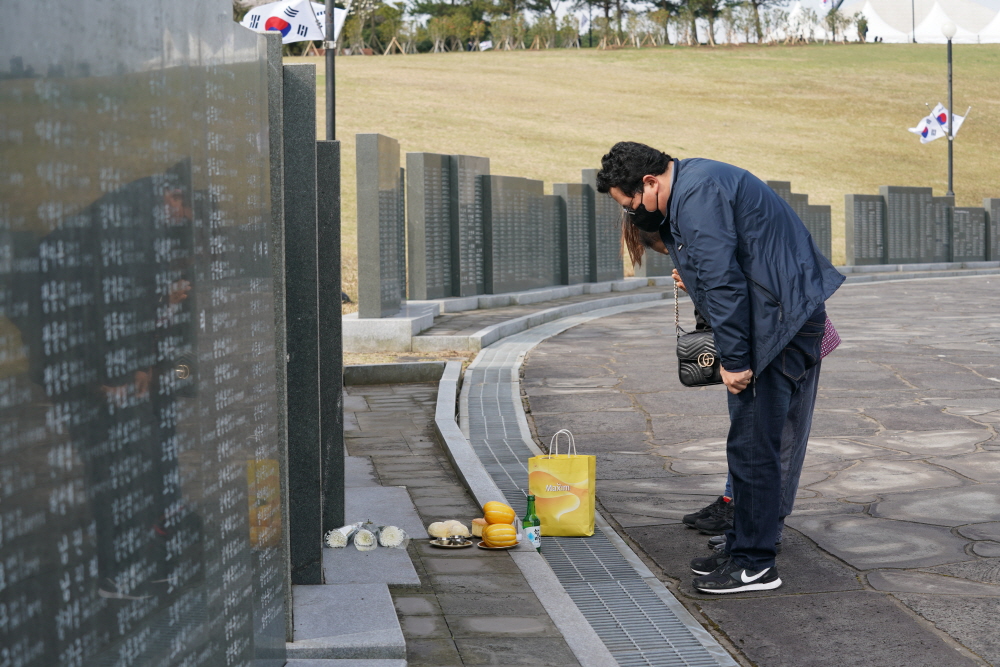
As the government had announced the social distancing rules to prevent the spread of COVID-19, the number of attendees at the memorial ceremony was limited to around 150 and all of the seats were placed 2 meters apart from each other.
Hosted by the Ministry of the Interior and Safety and organized by the Jeju Special Self-Governing Province, the memorial ceremony was held under the theme of “Heal the Wounded Hearts, Transmit the Memory of 4·3 to the Future, and Bring Peace to the World.”
The event was attended by President Moon, Justice Minister Choo Mi-ae, and ruling and opposition party leaders, including Democratic Party floor leader Lee In-young, United Future Party floor leader Shim Jae-chul, Justice Party leader Sim Sang-jeung. and Party for People’s Livelihoods floor leader Jang Jung-sook. Guests also included local key figures such as Jeju Governor Won Heeryong, Jeju Provincial Council Chairman Kim Tae-suk, Jeju Superintendent Lee Seok-moon, Jeju District Court Chief Judge Lee Chang-han, Jeju Regional Chief Public Procurator Park Chan-ho, Jeju Mayor Ko Hee-bum, and Seogwipo Mayor Yang Yun-kyung. Bereaved families of Jeju 4·3 victims and other officials of 4·3-related organizations and groups joined the ceremony, including Song Seung-moon, chairperson of the Association for the Bereaved Families of Jeju 4·3, and Yang Jo Hoon, president of the Jeju 4·3 Peace Foundation.
It was President Moon’s second visit to the memorial ceremony since 2018, marking the first time a sitting president has twice attended the event. Also noticeable is that this year’s attendees included members of the Police Honor Guard for the first time in history. The Police Honor Guard, for reconciliation and mutual benefit, supported the guests’ offering of flowers and burning of incense in honor of the Jeju 4·3 victims.
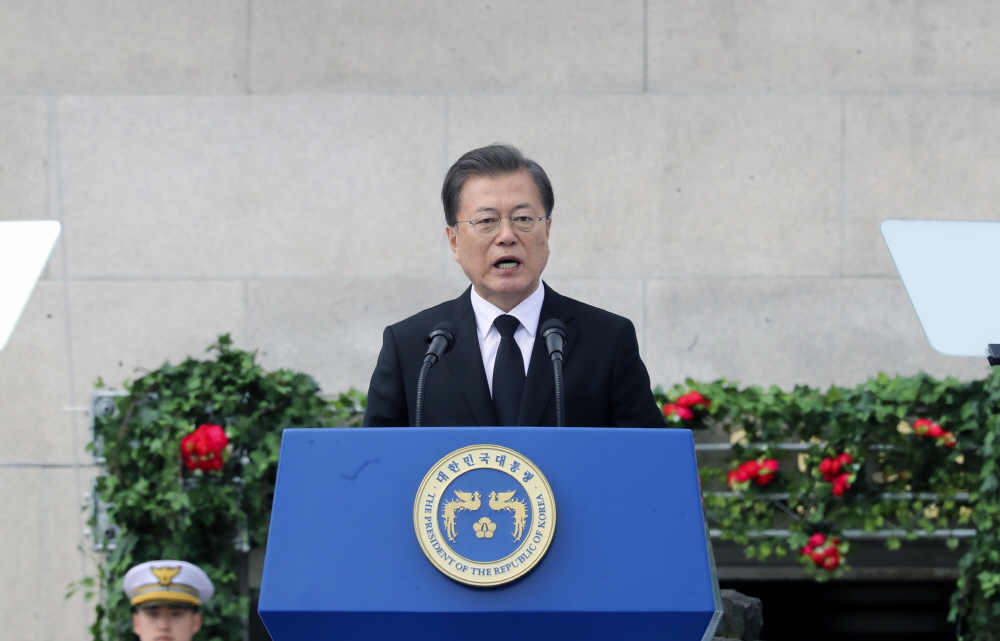
President Moon
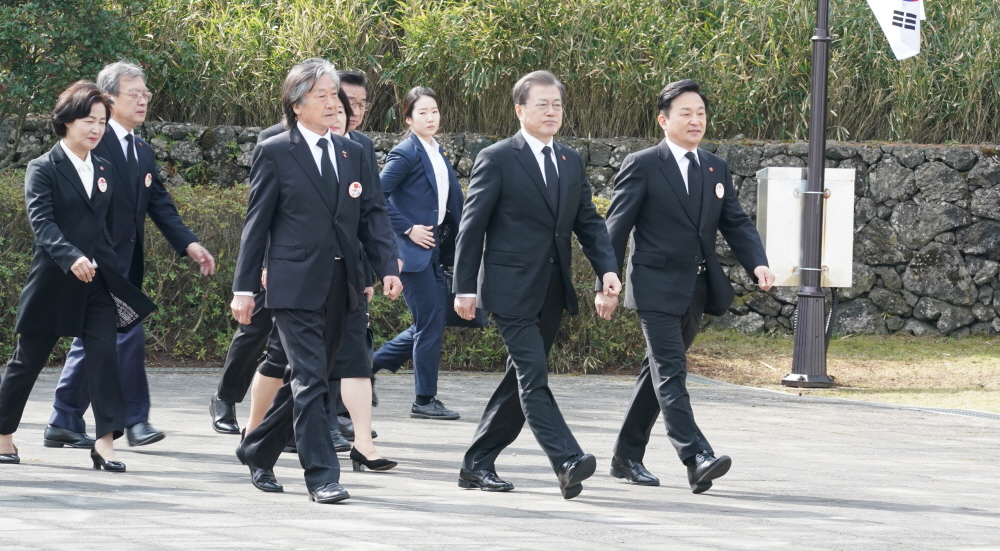
▲ Revising Jeju 4·3 special act to emphasize the offering of reparations for damages caused to victims and bereaved families
At 10:00 a.m., a siren was sounded across Jeju Island in silent tribute, marking the beginning of the memorial ceremony.
Song Seung-moon, chairperson of the Association for the Bereaved Families of Jeju 4·3, recited poet Kim Su-yeul’s address. After the recital, the president and the first lady offered flowers and burned incense, followed by the participants pledging allegiance to the nation and the president delivering his memorial speech.
“Jeju is now no longer lonely,” President Moon said, stressing that Jeju 4·3 will be passed down to and remembered by future generations, and will serve as a compass for human rights, life, peace, and unity.
Moon said in his address that it is the country’s obligation to embrace the agony of the victims of Jeju 4·3 and the bereaved families and restore their honor through revealing the truth of the island’s tragic history. Truth, he said, can lead to reconciliation and mutual benefit only when it meets justice, and it is imperative for a nation to establish truth not only as historical justice but also as legal justice.
The former human rights lawyer also pointed out that the bill to revise the Special Act on Discovering the Truth of the Jeju 4.3 Incident and the Restoration of Honor of Victims — which includes reparations and compensation that constitute the foundation for a complete settlement of Jeju 4·3 — is still pending in the National Assembly. He expressed that he truly feels heavy-hearted as president because some victims have received only partial reparations through individual lawsuits or government funds for medical treatment and living expenses, while statutory reparations and compensation have yet to be made.
Stressing that there is no longer any time for delays under these circumstances, he pledged that the government will continue to make efforts to ensure that practical reparations and compensation are realized while the victims and bereaved relatives are still alive. He also requested special consideration and support from politicians and the National Assembly to revise the Jeju 4·3 special act.
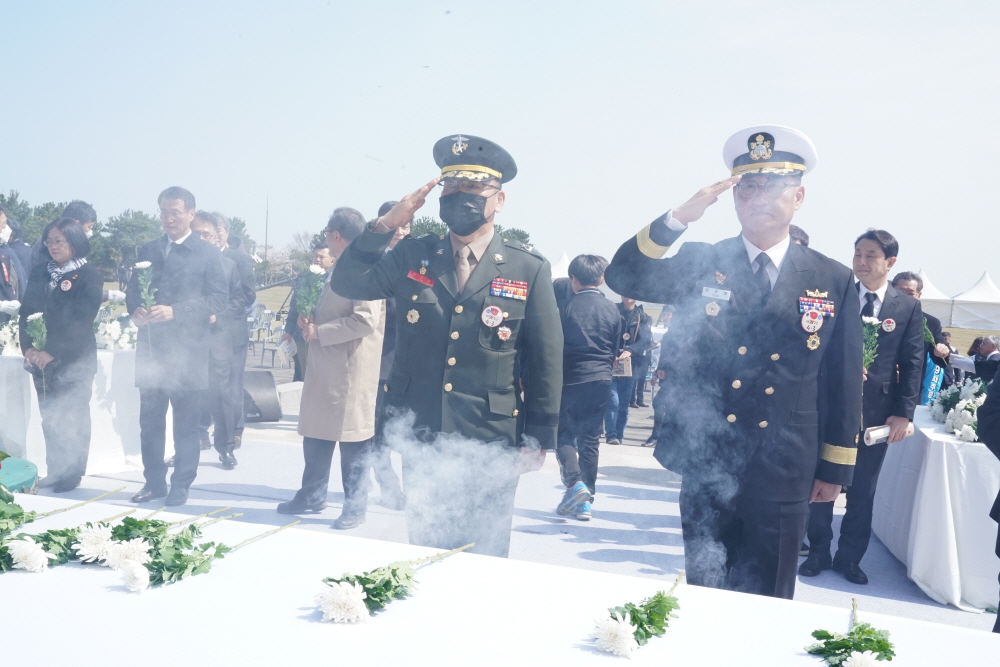
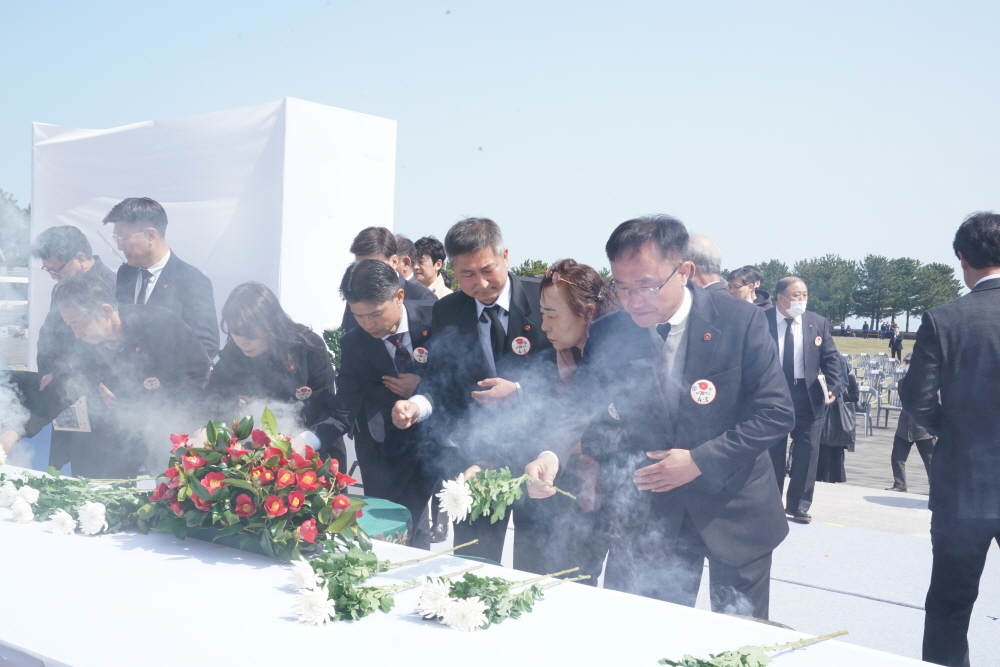 “In addition to these legislative efforts, the government will promptly act accordingly,” he said.
“In addition to these legislative efforts, the government will promptly act accordingly,” he said.
Before concluding his remarks, President Moon pledged the government’s support to move forward toward reconciliation, mutual benefit, peace, and human rights, together with the residents of Jeju, bereaved relatives, and the people. Finally, he said, “the stories of truth, justice, and reconciliation that began from Jeju 4·3 will remain for our descendants a touching history of recovering hope amidst sorrow.”
During the memorial ceremony, “A letter to my great-grandfather” was read by 15-year-old Ara Middle School student Kim Dae-ho, a great-grandson of the late Yang Ji-hong who died during Jeju 4·3.
The Jeju 4·3 Peace Foundation reported the identification of excavated remains on Jan. 22, and Yang’s remains were returned to his family. During the reporting session, Yang’s daughter Yang Chun-ja, 75, burst into tears in front of her dead father’s burial urn. People on the site expressed pity at the scene where Kim Dae-ho was standing by his grandmother to console her.
Kim wrote in his letter: “Great-grandpa! I am grateful that you finally returned to us, back to your daughter.”
On behalf of his great-grandfather and grandmother, he expressed gratitude to all of those who discovered his great-grandfather’s remains.
Finally, Kim looked at Yang, his grandmother, sitting in the audience and continued to read: “Now that you’ve held your father you missed for more than 70 years in your arms, I hope you will let go of the deep sorrow you feel and stay healthy beside me as long as you can.”
While listening to her grandson reading the letter, Yang wiped tears from her eyes.
The memorial ceremony concluded with singer Kim Jin Ho performing “Family Picture” in memory of the victims as a heart-rending photo exhibit of surviving victims of Jeju 4·3 and sites of massacre played upon a large screen on the stage. The photos were taken by photographer Kim Eun-ju and the Jeju 4·3 70th Anniversary Commemoration Project Committee in 2018 to mark the 70th anniversary of Jeju 4·3.
▲ May the deceased close their eyes, and the living hold each other’s hands
After the memorial ceremony, President Moon entered the Ashes Enshrinement Hall in the Jeju 4·3 Peace Park, guided by Yang Jo Hoon, president of Jeju 4·3 Peace Foundation. Accompanied by Yang Chun-ja and her family, the president and the first lady paused in front of late Yang Ji-hong’s remains and paid silent tribute.
President Moon then visited the Memorial Altar in Yeongmowon in Hagwi Village. Emphasizing the significance of Yeongmowon on his social media, he wrote that Yeongmowon is a space for harmony that was established in memory and honor of the Hagwi-based independence activists, fallen heroes, and Jeju 4·3 victims alike. He then stated that three memorial monuments were unveiled in the park in 2003, including Yeonghyeonbi for the independence activists, Chunguibi for the fallen heroes, and Wiryeongbi for the Jeju 4·3 victims. He also introduced a touching epitaph written on the back of Wiryeongbi, which read: “Looking back on the past years, it turned out everyone was a victim. We hereby erect this monument together to show that we all forgive one another. Hence, may the deceased close their eyes, and the living hold each other’s hands.”
In his final message, President Moon wrote: “This may be the spirit reflected in Jeju 4·3. Hopefully, you will have an opportunity to visit [Yeongmowon] and read the epitaph.”